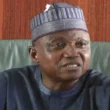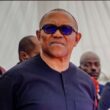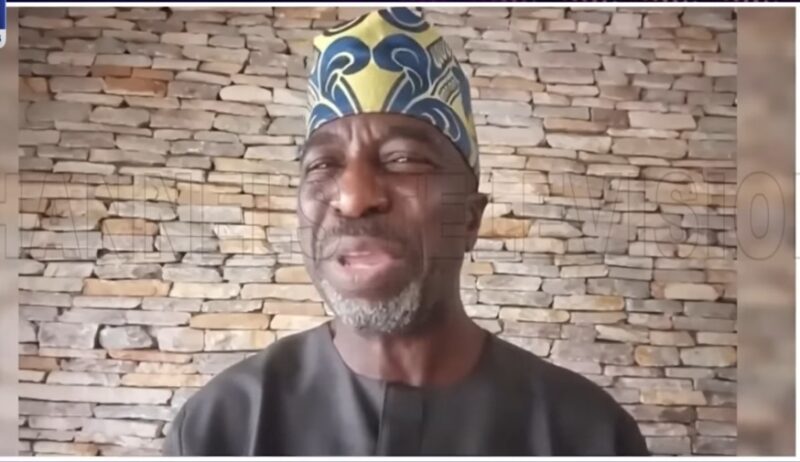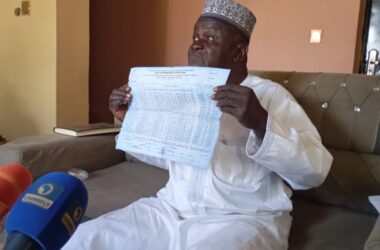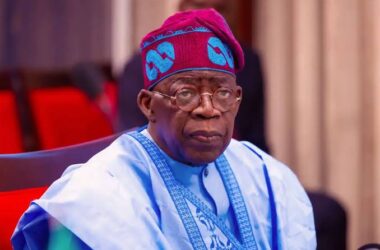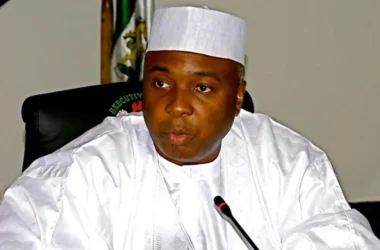Bola Ige’s son has urged President Bola Tinubu to give his late father, Chief Bola Ige, greater national recognition, arguing that the former Attorney General of the Federation, who was assassinated while in service, deserved the Grand Commander of the Order of the Niger (GCON) rather than the Commander of the Federal Republic (CFR) recently awarded to him.
Speaking on Inside Sources with Laolu Akande on Channels Television, Ige’s son recounted the harrowing experiences of his father and the unfulfilled dreams that were violently cut short in December 2001.
“Honestly, if I had my way, I would have thought that it would have been GCON that he would have been given, the fact that he was assassinated while in service. The killers are still walking. Make those that did it uncomfortable. I plead with the government to relook at the case as well as other unsolved murders over the years,” he said.
“My father was taken to the worst prison in Nigeria, in Makurdi. Nobody knew where he was for 63 days,” he recalled.
“He wanted to run for president. He had a plan. He felt their generation had to make things right in this country. When [military head of state General] Abdusalami said he was leaving, he saw an opportunity to reshape Nigeria.
“Unfortunately, his colleagues decided to checkmate him because they felt that they couldn’t control him. Thereafter, he joined the Obasanjo government. Then, he was assassinated on the 23rd of December 2001, which is a precursor to Black Christmas.
Beyond recognition for his father, Ige’s son challenged the federal and state governments to focus on reviving the fundamentals of human capital development, which he argued have been abandoned in favour of short-term, flashy infrastructure projects.
“And we’re not saying that that is not important,” he explained, “but I would say that they concentrate more on the optics, and the fundamentals of human capital development have been jettisoned.”
He lamented how successive administrations had failed to build upon the education legacies of leaders like Chief Obafemi Awolowo and Bola Ige, leaving critical school infrastructure to decay.
“Because again, look, you can go around, there are lots of abandoned classrooms, some of them dating back to the Awolowo time. So now you say Awolowo time, Bola Ige time, and since Bola Ige, not one, not one additional school has been built. Not one,” he observed.
Ige’s son insisted that meaningful development requires deliberate investment in education and skills, which he argued would serve Nigeria better than mere road contracts and grandiose projects.
“There must be deliberate action over and beyond paving roads,” he stressed. “Obviously awarding contracts is probably lucrative for those that want to have some form of gain, but the roads will wear. However, if you invest in young people for posterity’s sake, you will…”
He drew inspiration from the far-reaching educational policies of the past, recalling how bursaries and easy school access helped build Nigeria’s skilled workforce.
“We’re talking about a deliberate policy initiative 46 years ago that was implemented, of which you were a beneficiary and a host of others were beneficiaries,” he said. “That was even secondary school. Bursary was given to those in polytechnics and university. Bursaries, there was 500 Naira, which was actually a lot more than the school fees was at the time.”
He described how the system ensured education was physically accessible to all:
“The formula was within X amount of meters, you must go to the nearest primary school. Within about one kilometer, you must go and register the nearest secondary school. And therefore, the highest institutions, you can walk three to five kilometers. And that was the model. And it worked,” he noted.
Highlighting the continuing dividends of those policies, he added:
“Yes, you can say that they really liberalized education, but hey, those that benefited from it are alive today and doing brilliant things across the world,” he affirmed.
In closing, Ige’s son called on President Tinubu and other Nigerian leaders to revisit proven frameworks of human capital investment, arguing that Nigeria’s future rests on the shoulders of a properly trained, motivated, and empowered younger generation.
He warned that prioritizing projects aimed merely at creating impressions over people-focused policies would continue to endanger the country’s long-term stability and growth.



